RAPPER’S DELIGHT | P1-23 CS 247G
Luc Alvarez, Drew Silva, Sasha Moore
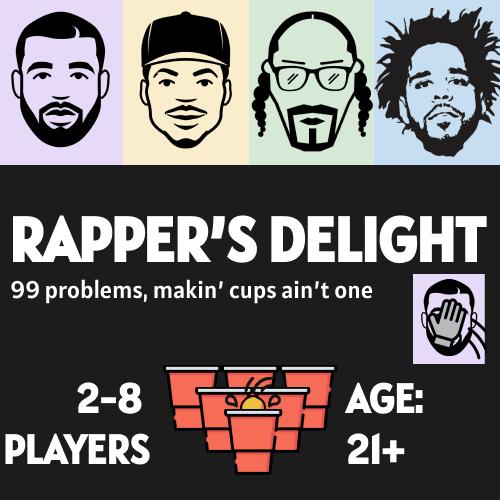
Fig. 1: Final mockup of front of box design.
Artist’s statement
Rapper’s Delight is a combination of classic cup-based party games and the fast-paced fun of Taco, Cat, Goat, Cheese, Pizza. In taking elements from each, we believe that we’ve made a fun, team-based game combining physical skill and reaction times in just enough of a competitive environment to encourage friendly banter and casual conversation between teammates and opponents. The game’s rules and supplies are simple enough to start playing in just a few minutes and the game is able to be played by any number of people greater than 1, both of which make it a perfect game for a party environment. Through clean design, branding that matches our target demographic of college-aged partygoers, and simple yet fun gameplay, Rapper’s Delight is a game each of us could bring to a party with friends or strangers and have a fun time playing.
Concept map
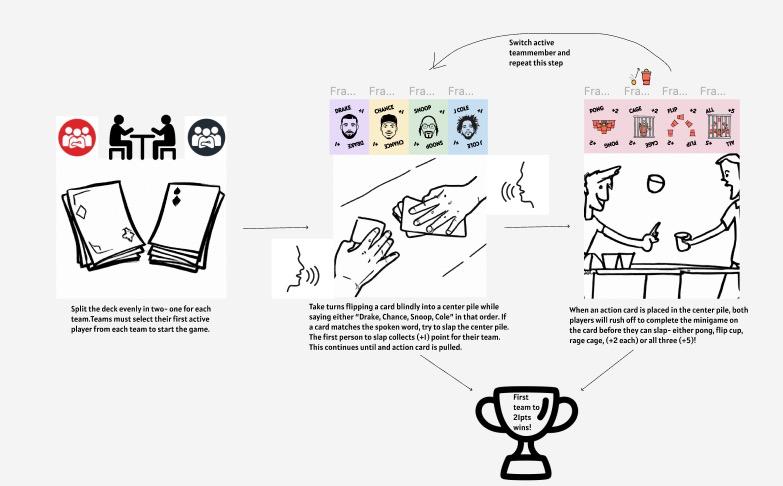
Fig. 2: Rapper’s Delight concept map
Initial decisions about formal elements and values of your game
We wanted to incorporate sensation as a type of fun, incorporating elements of our favorite physical skills-based drinking games, while also allowing players to go beyond a simple drinking game and facilitate discovery/getting to know one another. Players had to play truth or dare as a consequence of losing a cup. When we decided the Truth or Dare aspect didn’t fit into the party setting we were going for, we dropped this core value.
Despite drastically changing the core concept of our game, the aspect of fellowship has remained a crucial element of our game throughout every iteration.
We kept players on teams, as we noticed the bond formed with your teammates led to more meaningful interactions and gameplay as opposed to individual challenges. While not forcing the same level of revealing situations as Truth or Dare, we believe significant bonding and friendship formation can come from playing this game in teams.
Testing and iteration history:
Iteration 1: Beer Pong x Truth or Dare
This iteration was our original idea for the team. We never ended up playtesting a version with users as we quickly pivoted away from the truth or dare element. This was mainly due to a realization that games like truth or dare are highly variable and require very specific situations to play right. In most party settings, especially from our experience, games of truth or dare usually separate you from the rest of the party as the magic circle closes in and outsiders are left out of the fun. Our goal for this project was to create a game that could quickly be played by anyone and everyone and have a good, easy-going time, rather than one focusing on more emotional intimacy. Plus, a version of this game had already been created.
Iteration 2: Heist
The second version of our game was a reworked beer pong with few distinguishing elements. The major two elements of the game that were different was the inclusion of mini-games and the ability to steal cups. Mini-games allowed for more variety of gameplay, with the addition of rage cage and flip cup in addition to the already present cup pong. This mechanic is something we ended up keeping in our final iteration. Our second mechanic, the ability to steal cups, was meant to add in more late-game excitement as momentum swings become more and more common, but what ended up happening in our playtest was confusion and a general consensus that they’d rather just play regular cup pong than our “off-brand” version. Through this iteration, we knew that we had to push much further in distinguishing our games from the one we were modding if we wanted to create one that would genuinely appeal to individuals. We also saw that we would need to make sure our game could be picked up quickly, as most people at parties don’t want to spend more than 5 minutes learning a new game when they can just play ones they already know instead.
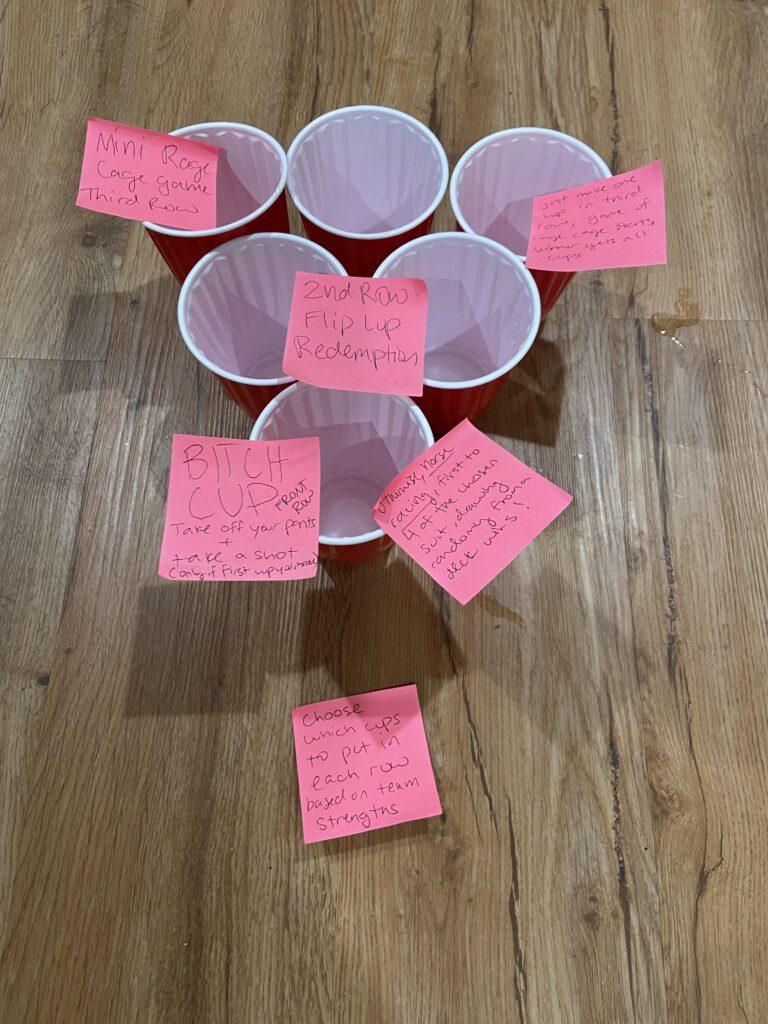
Fig. 3: Heist prototype with rough outline of rules.
Iteration 3: Rapper’s Delight
This iteration is the ultimately one which we decided to keep as our final game. Built on our past realizations that we had to keep the game easy, quick and accessible from our discussions on truth or dare, as well as different enough from other games to add appeal, we created Rapper’s Delight — a game which combines elements of Taco, Cat, Goat, Cheese, Pizza with cup-based minigames as action cards.
Our first playtest was at Pluto’s game night where we got a generally good reception, but also with some good constructive feedback. The major change we made was creating a points system, rather than relying on the same card-mechanics as Taco, Cat, Goat, Cheese, Pizza. Players said that they felt like the game was unbalanced with “all” cards where players have to play 3 mini-games being worth the same as a single slap. For example, one player was somewhat dissatisfied after completing a turn of flip cup, pong, and rage cage, only to receive a reward equivalent to if they had just slapped a normal card in the first place. Players also did not find the scoring method intuitive. This iteration followed the guidelines of Taco, Cat, Goat, Cheese, Pizza in the sense that “losing” a round meant taking all the cards in the pile. Multiple players said that because being the first to slap a card was a good thing, they naturally want to take all of the cards that are under their hand. They were confused when the cards were taken away from them. This feedback caused us to rethink what it means to win Rapper’s Delight, and if acquiring/disposing of all the cards in the deck was the most effective way to end the game.
Our final playtest was in class where we got more feedback on clarifying rules, making a target score, and making a system for swapping teammates. Our playtest used a set of standard cards rather than our custom rapper cards, so some players were unsure of what to do when certain cards were drawn, especially conflicting ones (for example, an ace of hearts was drawn when hearts was said, leaving one player to slap the card thinking they won and the other confused on what games they were supposed to be playing when both were supposed to be playing each of the three games before slapping). This revealed to us the need for creating custom cards with a theme, both to connect with players and to make the actions more clear. The game also began without a clear end as there was no set score and having one team end up with all the cards seemed to be a monumental task. In this playtest, we instituted a points system where for each slap, the team that slaps gets a point, for each mini-game, the winner gets two points, and for each “all” card, the winner gets 5 points. The game would end when one team gets to 21 points and wins. To keep track, we had teams keep their winning cards so they could add up their point total at any time. The last change we made through this playtest was making a system for swapping teammates. We began with two teams of two, with two playing and the other two sitting out. But, after a while, the players not playing asked when they would get to swap in, which we then realized we hadn’t formalized. To make sure the game stays interesting for all players, we then decided that after every game is played, teams must rotate who is playing.
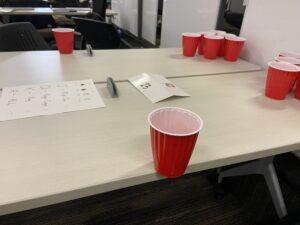
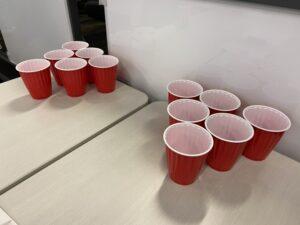
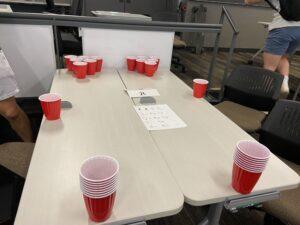
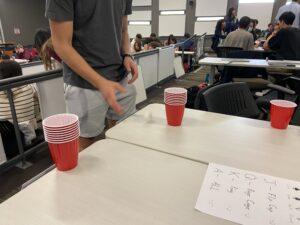
Fig. 4: set-up and gameplay of final in-class playtest. Note, for this playtest, due to time constraints, we played with a standard deck of cards, rather than our custom thematic ones, but the overall mechanics of the game were the same as our final prototype.
Lastly, while formalizing our rules, we realized there were some edge cases where the 21-point total would not be reached before one team had all the cards. To remedy this, we altered the amount of game cards to be 4 of each type, meaning that there’s 44 game points in play, essentially guaranteeing a winner is eventually crowned.
Video of the Final Playtest
Print-and-play
https://docs.google.com/document/d/1j1oyzC0Y5qZQp1V1ucrXtfC8PmJLseAgE0zNNFuf8qE/edit?usp=sharing
Final prototypes of box, card, and instructions designs
Rapper’s Delight Rules
- Shuffle the cards and split them into two piles
- Split players into two teams, each starting with one of the two piles
- One person from each team sits at the table across one another.
- The two players, who we will refer to as the “active” players, take turns flipping over the top card on the deck and putting it in the middle of the table.
- Every time you play a card, say the next word in the following sequence as you place the card on the table: Drake, Chance, Snoop, Cole
- For example, if the person before you just played a card and said “Drake”, then you would say “Chance” when you place your card in the middle of the table.
- When a player says “Cole”, the next player will say “Drake” and the process will repeat in the same order
- When the card played matches the card placed on the table, all players slap the card as quickly as they can. The first person to slap the card adds the slapped card to their “won” pile, while the loser takes the remainder of the cards and puts them at the bottom of the pile.
- There are four types of special cards in the deck: Flip, Pong, Rage, and All. When a special card is placed in the middle of the table, the two players must complete a specific action before slapping the pile.
- Flip: Place a cup on the edge of the table and “flip” it such that the cup starts face up and lands face down. Once the cup has been flipped, the player can run back to slap the card.
- Pong: There will be 6 cups set up for each team in a pyramid formation. These cups will be arranged at one end of a table, and each active player must stand at the opposite end of the table. Each player has to throw a ping pong ball into any of the 6 cups in their stack before slapping the card. If they miss, they must get their ball, return to the other end of the table, and continue throwing until one of the players makes it in a cup and slaps the card.
- Rage: Each team will have a stack of cups facing up and a ping pong ball. The active player from each team has to bounce the ping pong ball off the table and into the cup before slapping the card.
- All: The two active players have to complete all three activities before slapping the card on the table.
- The game ends when the total number of points in one team’s “won” pile reaches 21. The rapper cards are worth a point apiece, while the special cards Flip, Pong, and Rage are worth two each. The All card is worth a whopping 5 points, so make sure you’re ready to play some mini games!
- Players will swap out with another person from their team after a special card is won by either side.



